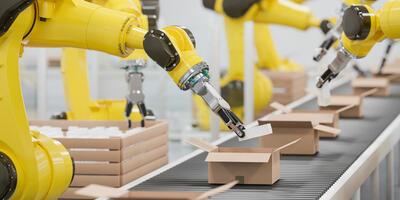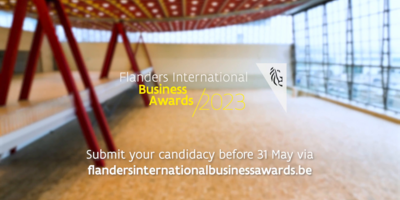
Machinery & robotics
When it comes to machinery and robotics, Flanders has the ‘tools’ for innovative, production and commercial success. No matter which type of know-how, talent or other enablers you need, the region has you covered, thanks to its high-tech ecosystem: from mechatronics to smart technology, digital innovation, additive manufacturing, cleantech and more.
Quick facts about Flanders’ high-tech industry
Business activities, machinery and robotics are firmly embedded in Flanders’ thriving high-tech services and manufacturing industry. The following facts and figures highlight its main credentials:
- The technology industry in Belgium and Flanders as a region grew by 1.7% in 2019 to an absolute record of EUR 129.4 billion in turnover (source: Agoria, 2020 figures).
- At Sirris, the collective innovation center for the manufacturing industry, some140 technology experts realize more than 1,800 Industry 4.0 projects for over 1,500 companies every year (source: Bloovi.be, 2019).
- Various production sites in Flanders have been presented with the Factory of the Future label by sector federation Agoria and innovation center Sirris. Winners include Daikin Europe (Ostend), Punch Powertrain (Sint-Truiden), Ontex (Eeklo), Rousselot (Ghent), Nuscience (Drongen), BMT Aerospace (Oostkamp), Newtec (Erpe-Mere), and more.
Home base for smart manufacturing masters
Flanders’ technological industry is driven by big (international) names and strong innovators that are shaping the future of manufacturing, machinery and robotics. By setting up a base in the region, you’ll be in the company of enterprises with impressive track records that have established HQs and R&D centers in the region, including Atlas Copco, CNH, Daikin, etc.
|
Atlas Copco in Wilrijk: from MaaS to smart factory Swedish industrial group Atlas Copco has its head office for the production of compressors in Wilrijk (Flanders), where it offers remote monitoring as a connected service. This enables Atlas Copco to carefully manage the maintenance of its industrial compressors, extend their lifetimes and reduce unplanned downtime. In addition, Atlas Copco offers machines-as-a-service (MaaS) while interconnecting production activities: the group is investing EUR 15 million per year in making its site a smart factory (source: De Tijd, Sterck). |
|
CNH Industrial in Wevelgem: precision agriculture through robotics In Zedelgem, the Flanders site of multinational CNH Industry looks back on a long history dating back to a threshing machine factory that was built in the early 1900s. Today, the site is home to one of the group’s main R&D and manufacturing facilities in Europe, specializing in the development and production of robotics and sensors for precision agriculture (source: CNH Industrial). |
|
Tractonomy Robotics in Kortrijk: hassle-free towing robots Headquartered in Kortrijk, Flanders, Tractonomy Robotics develops and builds autonomous towing robots for hassle-free industrial cart handling in production sites and warehouses. Thanks to the use of AI as well as advanced mechanical techniques, the robots can be deployed to transport a variety of carts of up to 750 kg without the need to make any changes to the existing infrastructure. In March 2020, the company was selected for the imec.istart business accelerator program to further boost its robot-as-a-service portfolio (source: Engineers Online, imec.istart). |
|
Octinion in Leuven: first-ever strawberry picking robot In a world first, Octinion – from Leuven, Flanders – designed and developed a robot that recognizes, picks, sorts and checks the quality of ripe strawberries in greenhouses. It does this autonomously by means of multiple cameras that determine where the strawberries are located and how ripe they are. Furthermore, farmers can use the data collected by the picking robot to optimize their greenhouses (source: Make it in Belgium). |
|
Picanol in Ypres: high-tech weaving machines Based in Ypres (Flanders), machine manufacturer Picanol is an innovative force to be reckoned with. To highlight just one example to back this claim: the company participated in ESTO-MAD to build the most energy-efficient weaving machines in the world. The goal of this European project is to develop energy efficiency software tools for sustainable machine design. It considers the energy consumption of both the individual parts and the entire machines as fixed parameters in developing software for industrial machines. Picanol produced the benchmark for the ESTO-MAD project: a rapier weaving machine that goes by the name of Optimax and uses 10 to 15% less energy, thanks to adaptations to the weft drive system (source: Make it in Belgium). |
An innovative high-tech ecosystem at your service
Flanders stands out as a leader in machinery, robotics and other high-tech domains – and it’s not just because of its innovative manufacturing industry, where automation, flexibility and customization are in the spotlight. The region is also home to a strong network of academic and private enterprises that are enabled by a supportive government.
Regardless of your sector, you’re sure to find the perfect family of high-tech facilitators in Flanders. Below, you can find a non-exhaustive overview.
(Strategic) research centers and research groups
In Flanders, your high-tech company can rely on the expertise and knowhow of Flanders’ strategic research centers, which build on the fundamental research carried out by the region’s universities, as well as various other sector-dedicated research centers. These include:
- Flanders Make is Flanders’ strategic research center for innovation in manufacturing. Closely associated with the region’s universities, Flanders Make strives to enable the advent of smart systems by focusing its research on flexible assembly, motion products as well as decision & control and design & optimization for production and vehicles.
- imec, Flanders’ strategic research center for nano- and digital technology, is dedicated to innovating across a wide range of high-tech industries such as wireless technology, nanoelectronics, IoT, machine learning and more.
- Sirris, a collective innovation center, network driver and incubator covering various R&D fields relevant to the high-tech industry.
- Highlighting one of Flanders Make’s core labs, CoSys-Lab performs industry-oriented research in the domains of machine building, mechatronics and cyber-physical systems. In particular, it focuses on sensors, signal processing, embedded control, and related model-based design methodologies and optimization techniques.
|
Imec innovation in action: cobot Walt helps build vehicles An imec project titled ClaXon, which investigated new ways that people can collaborate with industrial robots, resulted in Walt – a learning, interactive collaborative robot used by Audi in its Brussels facility. Unlike other industrial robots, cobots are not walled away from people to prevent accidents, but work alongside and with them, increasing precision. Workers communicate with Walt using gestures, and Walt can even learn new and complex tasks through demonstration. |
In addition, your company can choose to work directly with a myriad of fundamental technological research groups and competence centers at Flanders’ five universities, which focus on industry-driven innovation and collaboration. Some prominent examples:
- Mecha(tro)nic System Dynamics (LMSD) and Robotics, Automation and Mechatronics (RAM) – two KU Leuven departments that coordinate a wide variety of research groups and tracks relevant to smart manufacturing and robotics.
- Leuven.AI – a KU Leuven initiative within the context of Flanders’ impulse program on artificial intelligence (which is aimed at research, industrial implementation, ethics and training). It ensures smooth coordination and efficient cooperation between a number of KU Leuven’s multidisciplinary research groups and labs that work on AI topics.
|
Soft, self-healing robots – with expertise from VUB To enable robots to handle fragile objects with more dexterity and give them bigger roles in our daily lives and work, the next generation of robots will be soft – as in ‘made from flexible materials’ – while also being able to ‘feel pain’ and heal themselves. At least, that’s what researchers from VUB, one of Flanders’ universities, have set out to achieve together with colleagues from imec. For three years beginning in 2019, this groundbreaking initiative receives EUR 3 million in European support. Called SHERO, the project is led by VUB and robotics research center BruBotics. VUB professor Bram Vanderborght: “In the past few years, we have already taken the first steps toward creating self-healing materials for robots. Through the additional research, we seek to ensure that robots are safer and more sustainable. Thanks to the self-repair mechanisms of this new generation of robots, complex and costly repairs could become a thing of the past.” (Source: BruBotics.) |
Zooming in on BruBotics
BruBotics is an initiative that unites various VUB research groups with a clear mission: to improve quality of life through human robotics. BruBotics is home to experts in engineering and life, computer and social sciences that work closely with industry partners. Below are just some of the research groups that work together with BruBotics:
- Artificial Intelligence Research Group – boasts unique expertise in multi-agent systems, reinforcement learning, evolutionary and hybrid AI, cognitive AI, computational creativity and knowledge representation.
- SMIT – associated with both imec and VUB, and dedicated to media, innovation and technology studies. Its expertise includes human-robot interaction, participatory design and co-creation, the study of user experience and acceptance, and business and policy analysis.
- INDI – develops pragmatic solutions for the deployment of robots in environments such as construction and agriculture, where the use of robotics is traditionally low.
- RERE-NEURO – focuses on rehabilitation research, neurological rehabilitation and rehabilitation psychology. It explores the effectiveness of rehabilitation robots and robotic assistance for neurological patients, as well as the psychological aspects linked to the use of robot systems in this environment.
- R&MM Group – concentrates its research on robotics & multibody mechanics (R&MM) and human-robot interaction (HRI).
Incubators, competence centers and tech campuses
In Flanders, there are many incubators that help high-tech companies thrive in many business areas by providing affordable office space, administrative services and even development tools. Here are just a few examples:
- Corda Campus – this extensive tech campus fosters fruitful relationships and knowledge sharing between tech companies.
- OMC – the Open Manufacturing Campus supports innovation in engineering and manufacturing.
- Orsi Academy – known for world-class, minimally invasive surgical training and test facilities, Orsi Academy also provides support to any organization or individual contributing to new developments in this area.
|
ORSI Academy: surgical robotics for the medical win Seeking new and innovative ways to make surgery minimally invasive, the ORSI Academy – based in Melle, Flanders – offers a state-of-the-art facility and every tool doctors need to master new surgical techniques using robots and assistive technologies. The institute partners with Flanders’ major universities and collaborates closely with industry leaders and expert hospitals. ORSI Academy also offers flexible incubation programs and tailored support for companies, individual physicians and even students for the development and testing of minimally invasive surgical technologies. |
Living labs
Flanders is home to a variety of living labs for technological industry players: open labs where companies can try out new technologies and carry out basic testing before making investment decisions. Numerous innovative topics and domains can be explored, from cobots and cybersecurity for machines to condition-based and predictive maintenance as well as production support software such as manufacturing execution systems (MES).
Big in high-tech niches
Flanders is home to a lot of expertise in particular high-tech branches, such as:
Additive manufacturing
Additive manufacturing (AM) technology is crucial to developing innovative mechatronic devices, machinery and production processes as well as novel control, diagnostics and material delivery systems. To enable this, organizations like Sirris, Agoria, Flanders Make and Flam3D work closely with AM research departments at all major universities and university colleges in Flanders.
Industry 5.0
Building smart factories requires mechatronics, robotics, digitization and the Internet of Things to go hand in hand. Flanders is home to some of the world’s most innovative R&D players, which support this ambition. To give just one example, the region’s strategic research center for nano- and digital technology – imec – empowers companies to ride the wave of the 5th industrial revolution. In addition, strategic research center Flanders Make plays a major role in enabling smart factories through mechatronics and robotics research.
Financing your high-tech business in Flanders
When deciding to establish activities or headquarters in Flanders, your high-tech company can reap the rewards of:
- government subsidies and support for investments in R&D and innovation, strategic transformation, ecological efforts, growth and other domains.
- tax incentives to fund a broad range of business activities.
- fiscal options to help you cut labor costs.
Tax incentives for research-intensive activities
Flanders offers access to several tax incentives that are particularly relevant to research-intensive sectors such as machinery, robotics and other high-tech activities. Examples include:
- the innovation income deduction – up to 85% of a company’s net innovation income can be exempt from corporate tax.
- the R&D investment deduction – 13.5% of the investment value (at once) or 20.5% of the annual depreciation (staggered).
- the R&D payroll tax exemption – 80% of the withholding tax on professional income for researchers and academic personnel.


